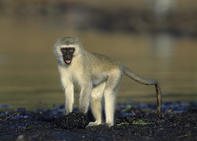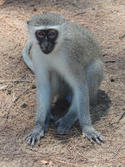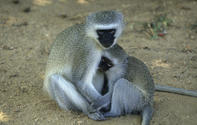Males Outrank Females
Groups of about 20 vervets make up a troop in which there is a strict hierarchy of rank amongst the males and amongst the females. All males outrank females and the status of an infant is inherited from its mother.

There is usually one male which dominates the troop overall and he, and a few other high-rankers is generally most in demand as a mate to the females. Dominance benefits females by allowing them the best access to prime feeding and sleeping sites. Vervet monkeys, unlike baboons, are territorial.
They demarcate their defended area by dispatching scent from the cheek and chest region onto the branches of trees. Where many vervets are found together in a large group, there usually is a particularly sought-after common resource like a tree in fruit or a source of water.
Although they will all make use of the resource, they do not necessarily do so amicably and once done will separate into their usual separate troops.
Aggression Vented

Vervet monkeys are gregarious and social creatures. Animals which live together are known as gregarious animals but not all gregarious animals are social.
Sociality depends on whether the animals within a group interact with other members of the group. Vervet monkeys use tactile communication in the form of mutual cleaning known as allo-grooming, to forge relationships and elicit favours amongst themselves.
Females groom the most and lower ranking individuals always try to curry favour with higher ranked animals through grooming.
Visual displays are important and the raising of an eyebrow might convey a threat while the baring of teeth or the bobbing of a head could mean aggression for the recipient. Within the group, more closely related individuals interact more intensively and rally together to support each other during disputes.
The majority of social interaction takes place during the rest period in the heat of the day. The vervet monkey status hierarchy works to absorb aggression within the troop.
If a dominant animal should attack a lower ranked individual in a display of status, the subordinate will not react to the attacker but rather will vent its frustrations on an even lower ranked member of the troop.
As a result, the lowliest of the social community can easily be picked out of the troop by a prevalence of bite marks at the base of its tail.
Stay or Leave

Females spend their entire life in the troop where they were born. Males leave the troop and join another as this improves their chance of rising in rank and ultimately breeding. Brothers band together and depart as a group once they reach sexual maturity and they usually time the departure with the onset of the breeding season.
The automatic departure of young males at this time also helps to reduce aggression within the natal troop as the dominant males need not exert discipline on the newly mature individuals. Sometimes older males may also disperse but these tend to join more distant troops and it is thought this behaviour contributes to healthy genetic exchange amongst a population.
By Megan Emmett